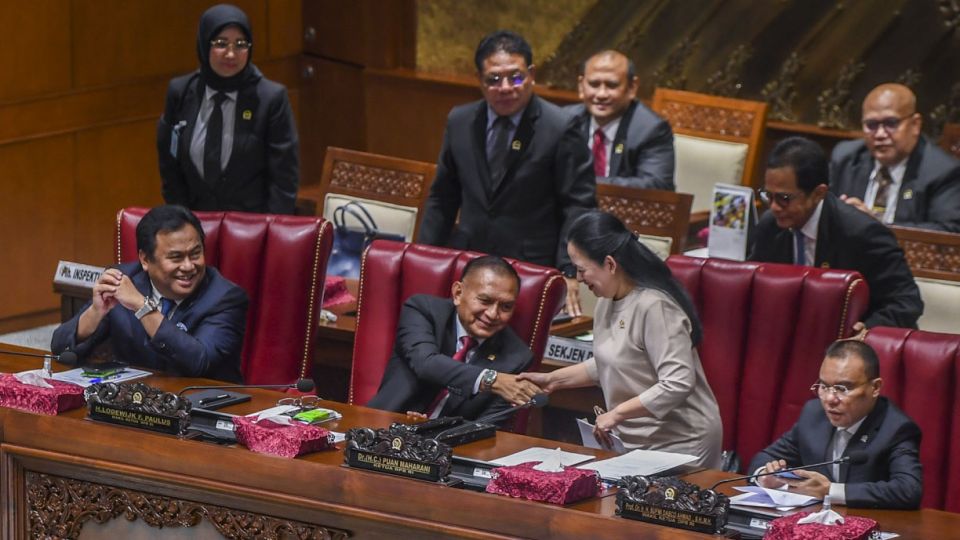April 15, 2024
JAKARTA – Plans to pursue a legislative inquiry into alleged irregularities in the February presidential election appear to have failed as the House of Representatives went into recess on Thursday, without a single political party aligned with losing candidates bringing a proposal to the floor.
Aside from their ongoing challenges to president-elect Prabowo Subianto’s landslide victory at the Constitutional Court, the two unsuccessful candidates, Ganjar Pranowo
Ganjar Pranowo, 55, is the former governor of Central Java (2013-2023), and before that, a lawmaker (2004-2013) for the Indonesian Democratic Party of Struggle (PDI-P). He has a postgraduate degree in political science from the University of Indonesia and is an alumnus of Gadjah Mada University’s (UGM) Faculty of Law.
and Anies Baswedan, had called for a House inquiry into the conduct of President Joko “Jokowi” Widodo’s administration in the lead-up to voting day.
They claimed Jokowi’s administration abused state resources for the benefit of Prabowo, who ran with Gibran Rakabuming Raka, Jokowi’s son.
But none of the political parties aligned with Ganjar and Anies appeared to be willing to take the lead in the legislature on Thursday, when House Speaker Puan Maharani wrapped up the sitting and let lawmakers go into a month-long recess without presenting any formal proposal to launch an inquiry.
In a press conference after Thursday’s closing plenary, Puan, a prominent executive of the Indonesian Democratic Party of Struggle (PDI-P), the largest party in the legislature and whose presidential candidate was Ganjar, declined to answer a barrage of questions about her party’s plans for a legislative inquiry.
Puan revealed last week that she had not given any instructions to the PDI-P faction at the House as a whole to roll out the inquiry, leaving it to individuals instead to decide whether to exercise their rights of inquiry.
When asked whether there was any initiative from party members to push forward the inquiry, Puan said there was no real progress made as of last week, suggesting that her party was still looking carefully at the support behind the proposal.
“This is the right of every member. If one feels that this is the best thing for the nation, go ahead. But we will see [how it plays out]. This is something that in reality needs political support, not just political will,” Puan said.
The PDI-P’s only pro-Ganjar ally in the legislature, the United Development Party (PPP), and three pro-Anies parties, the NasDem Party, the National Awakening Party (PKB) and the Prosperous Justice Party (PKS), previously claimed that they were ready to press on with the inquiry, but insisted that they would wait for PDI-P to take the lead.
Political commentators and analysts had been unsure whether the five parties in Ganjar and Anies’ camps would press ahead with the inquiry after some of the parties appeared to begin realigning themselves with president-elect Prabowo, who is now seeking to assemble his ruling coalition.
Prabowo has begun efforts to lure in parties from rival camps, paying a recent visit to NasDem chairman Surya Paloh, the main backer of Anies’ presidential bid. Surya was the first leader from the rival camps to congratulate Prabowo on his victory and later laid on a red-carpet welcome for the president-elect at his party headquarters.
Despite being touted as the forefront of the future opposition, the PDI-P has welcomed the possibility of its chairwoman Megawati Soekarnoputri and Prabowo having a post-election talk, noting that the two political heavyweights still maintained good personal relations, despite the party’s sour relations with its own nominal member Jokowi.
PDI-P secretary-general Hasto Kristiyanto last week blamed “external pressure” for reservations among its members about supporting the idea of launching the House inquiry.
He suggested that potential legal threats against its members and the risk of losing the House speakership to rivals made PDI-P lawmakers think twice about putting forward a formal proposal.
The PDI-P came out on top in February’s legislative election with the greatest share of the nationwide vote, which will likely translate into the greatest number of House seats and allow it to automatically retain the speaker’s position, as regulated in the prevailing Legislative Institutions Law.
But speculation has been rife that the pro-Prabowo parties are seeking to amend the law to give their camp a greater chance of securing the speaker’s seat, a position with significant authority to set the House’s agenda.
The proposal to revise the law was included on Wednesday in the list of legislative priorities for this year.
But deputy House speaker Sufmi Dasco Ahmad, who is a senior Gerindra politician, stressed that discussions over revising the law would not happen anytime soon.
“Then, under the leadership of a new House speaker, lawmakers will see whether there is still an urgency [to revise the law],” Dasco added.


